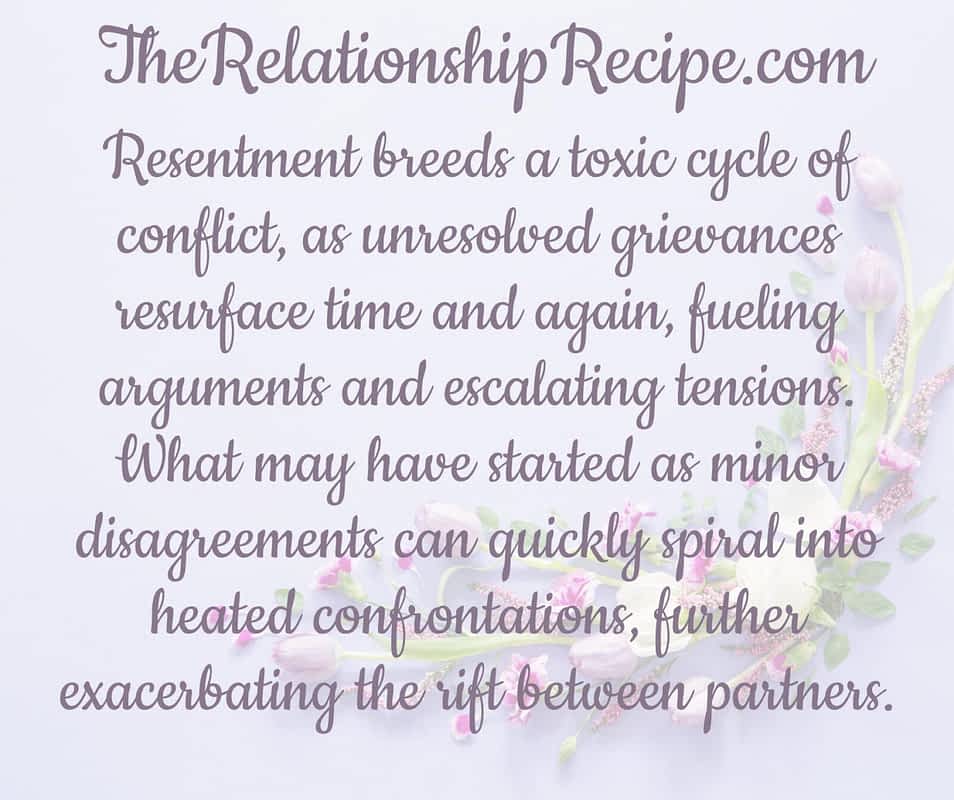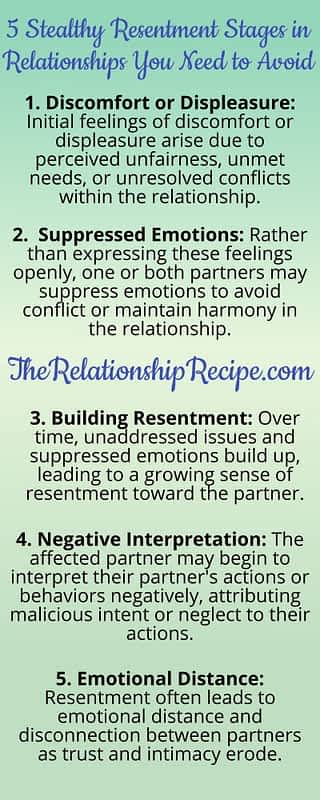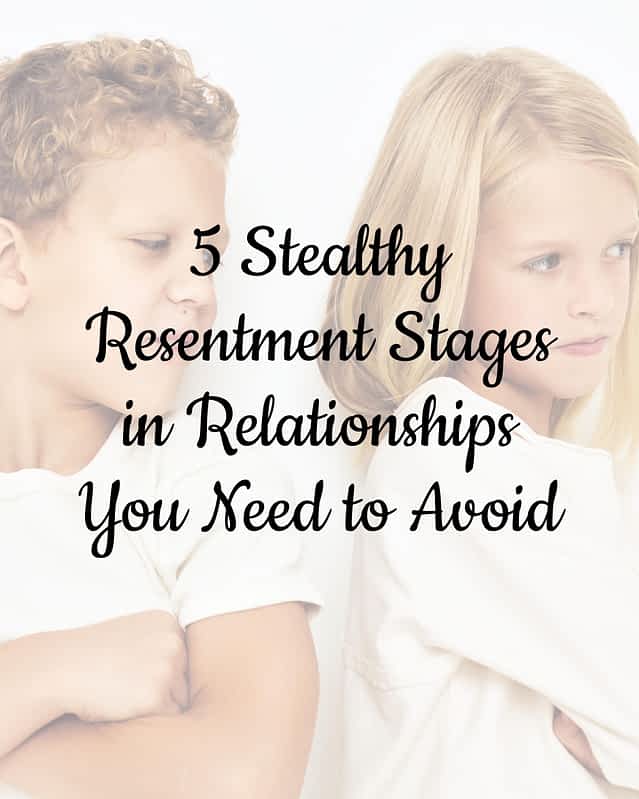5 Stealthy Resentment Stages in Relationships You Need to Avoid
Resentment stages in relationships don’t always show up with yelling, slammed doors, or dramatic exits. Sometimes, they just slide in quietly, and almost invisible.
Resentment.
That insidious, quiet little monster responsible for nuking millions of relationships. 👿
Why is it so hard to get past?
In my marriage, we’ve got front-row tickets to every single one of the phases of resentment. We don’t scream. We don’t cry. We barely talk unless logistics demand it. The silence isn’t comforting anymore, it’s just… tense. Unspoken, while being loud in its own way.
At first, I mistook the quiet for peace. But now, I’m boiling even when he’s not home. Like my body’s still arguing with him, even in his absence. I’ve tried replacing the bitter thoughts with good memories, but the emotional stages of resentment leave so little room for healing before the next wave hits.
This isn’t just a rough patch. It’s a pattern. A buildup. It’s exhausting.
What Causes Resentment in Relationships?
What causes resentment in relationships usually isn’t one massive betrayal. It’s the slow drip. The buildup. The stuff that doesn’t always make it into an argument, but still cuts deep over time.
The stages of resentment in a relationship might start with unmet expectations. You needed support, affection, effort, and instead, you got silence, and eye rolls. You didn’t ask for the moon. You just wanted to feel seen. But over time, those disappointments stack up like bricks between you.
Then there’s the communication breakdowns. The things you didn’t say because it wasn’t “the right time” or you didn’t want to start a fight. Or worse, the things you did say, but he just didn’t hear. Those unspoken truths become emotional landmines, quietly waiting to explode later.
Feeling unappreciated stings. When your efforts, your sacrifices, your daily emotional labor go unnoticed, it chips away at your sense of worth in the relationship. You stop feeling like a partner and start feeling like a background character in your own life.
Old arguments that never really got resolved, betrayals you “moved past” but never actually healed from – those stay in your body. You carry them, even when you try not to. And with every new disappointment, the quiet phases of resentment grows louder.
Left unchecked, it’s not just hurt feelings anymore. It’s disconnection. Detachment. That simmering anger you can’t quite shake. Even on the “good” days.

💡Key Highlights:
- Spot the quiet signs that resentment is creeping into your relationship
- Understand why those small annoyances can spiral into bigger issues
- Discover the emotional stages that often go unnoticed but matter a lot
- Learn what happens when resentment silently takes control
- Find out how recognizing these phases can change your relationship’s future

What are the 5 Resentment Stages in Relationships?
🚩Stage 1: Discomfort or Displeasure
This is where the resentment stages in relationships usually begin – with a twinge. A nagging feeling that something’s off. It might show up as irritation when your partner forgets something important, or that gut punch when your needs get brushed aside.
Discomfort and displeasure aren’t just passing moods. They’re signals. Your body, your intuition – they’re waving red flags, saying “Hey, pay attention.”
In the early days of love, we often confront this stuff head-on. We speak up. We cry. We lash out. Sometimes we even make up with steamy apologies and promises to do better. The issue with this is not every relationship moves past this stage. Some get stuck in this emotional loop: feel bad, react, repeat.
And when that happens, the hurt doesn’t go away. It just finds quieter places to live inside you. And that’s when resentment starts to take root.

🚩Stage 2: Suppressed Emotions
Here’s where the second of the stages of resentment in a relationship creeps in – when we go quiet. Not because we’re fine, but because saying how we really feel feels… risky.
We tell ourselves it’s just not worth the fight. We don’t want to make things worse. So we swallow our words. We bury the emotion. We play nice.
But it’s not peace. It’s self-protection disguised as harmony.
Sometimes we’re afraid of how they’ll react. Or worse, how they won’t. No emotion. No response. Just a shrug or that blank stare of indifference that makes you feel like you’re talking to a wall.
Other times, we’re scared of what might come pouring out if we do speak. Because once you start unraveling the frustration, the silence, the disappointments – it’s hard to stop.
So we keep it in. That quiet storm keeps building. The longer it sits, the bigger the explosion when it finally hits. Trust me, it always finds its way out, resentment doesn’t stay buried forever.

🚩Stage 3: The Build-Up
This is the slow boil, and one of the most dangerous emotional stages of resentment in a long-term relationship. You’re not yelling. You’re not crying. You’re just… tired. Fed up. On edge.
By now, the little things aren’t so little anymore.
You’ve been together long enough that the honeymoon glow is a distant memory. The daily irritations get relentless. You’ve asked, kindly, for the dishwasher to be loaded in a way that doesn’t make your eye twitch. You’ve begged (with grace, even!) for the toilet seat to stop defying gravity. You’ve explained your needs like a rational adult.
And yet, here you are. Still stepping into puddles of apathy and crumbs of “I forgot.”
It’s not about the damn toilet seat anymore. It’s about feeling like your words don’t matter. Like your requests, your needs, your voice, don’t land.
That quiet frustration and constant simmering is resentment starting to solidify. You’re not just annoyed. You’re hurt. And the space between you grows wider every day it goes unspoken.

🚩Stage 4: Assumed Intent
Now we’re deep in the phases of resentment; the part where everything starts to feel personal.
You’ve talked. You’ve cried. You’ve begged. Maybe even screamed into a pillow or slammed a cabinet or two. Hell, you’ve laid it all out more times than you can count, and still, the same stuff keeps happening.
So your brain does what it naturally does when it’s tired of being ignored: it starts trying to make sense of the nonsense. But not in a hopeful, maybe-they’re-just-distracted kind of way. No, this is the dangerous kind.
✔️They’re doing this on purpose.
✔️They know it bothers me and they still don’t care.
✔️Is this some twisted way of messing with me?
You start to question everything. Their tone. Their silence. You wonder if they’re being passive-aggressive, or just passively cruel. You even start to second-guess yourself: Am I expecting too much? Or have I just accepted too little for too long?
This is where paranoia shows up, dressed in old wounds. Every little action, or inaction, feels like a message. And the message? You don’t matter.
That resentment is no longer just simmering. It’s starting to poison the well.

🚩Stage 5: Emotional Distance and Disconnection
This is often the hardest of the resentment stages in relationships: emotional distance.
You’ve tried everything. You’ve talked, fought, cried, begged, and hoped. But nothing changes. So eventually, you give up. You throw in the towel.
In the name of peace, you choose silence. You stop bringing up the issues because, honestly, it just feels easier. You tuck your feelings away and simmer quietly on the inside. You stop reaching out emotionally, because what’s the point?
The painful truth is silence doesn’t heal. It doesn’t fix anything. It just builds walls where there used to be connection.
And with every brick laid, trust erodes. Intimacy fades. You start living alongside each other instead of with each other.
Sometimes, that distance feels bearable, or even safer, than the chaos of trying to fix something that feels broken beyond repair. And yes, sometimes that means risking the ultimate loss: the end of the relationship.
But recognizing this stage is your first step toward change – whether that means healing together or knowing when to walk away.

The Impact of Resentment in Relationships
Resentment doesn’t just quietly sit in the background, it grabs hold and shakes up everything in your relationship.
When those stages of resentment in relationships go unchecked, they start to seep into every corner of your connection. They eat away at trust, chip at intimacy, and twist how you see each other.
Communication takes the biggest hit. Instead of honest talks, you find yourselves avoiding real conversations or slipping into passive-aggressive digs. It’s like walking on eggshells around someone you used to feel close to.
Resentment fuels a toxic loop. Little annoyances that could’ve been shrugged off or talked through turn into full-blown fights. Every argument piles up, widening the distance between you.
If you keep letting resentment grow, that bitterness will eventually drown out all the good stuff. You’ll feel more like roommates or strangers than partners, stuck in a relationship that no longer feels satisfying or emotionally safe.

Final Thoughts: Don’t Let Resentment Win
Resentment in relationships isn’t just a small bump in the road – it’s a flashing warning light that you can’t afford to ignore. Letting those resentment stages in relationships slide by only gives it more room to grow, slowly eating away at trust and intimacy – the very heart of a strong partnership.
You don’t have to stay stuck in that cycle. Facing resentment head-on, with honesty and openness, can open the door to healing. When both of you commit to real communication, empathy, and forgiveness, you can rebuild what resentment tried to tear down.
FAQ: Resentment Stages in Relationships
1. What are resentment stages in relationships?
They’re the emotional phases couples go through when resentment builds—from discomfort to emotional distance if left unchecked.
2. Why does resentment happen?
Mostly from unmet needs, poor communication, or feeling unappreciated over time.
3. How can I spot the early stages of resentment in a relationship?
Look for discomfort or suppressed feelings—those little nagging irritations that keep popping up.
4. Can resentment stages in relationships be fixed?
Yes! Open talks, empathy, and honesty can break the cycle before it deepens.
5. What’s the difference between resentment and anger?
Anger is a quick flare; resentment builds slowly and sticks around if ignored.
6. How do emotional stages of resentment affect intimacy?
They create distance, making it harder to feel close or connected.
7. Why do couples stay silent during resentment phases?
Fear of conflict or feeling like nothing will change often leads to silence.
8. Can resentment lead to breakups?
Absolutely. If the stages of resentment in a relationship aren’t addressed, it can break trust and push couples apart.
9. What are common triggers in the phases of resentment?
Repeated disappointments, neglect, or unresolved arguments are usual suspects.
10. How do I prevent resentment from taking over my relationship?
Stay honest about your feelings, communicate early, and don’t let issues pile up.

Thank you for reading this post, don't forget to subscribe!







